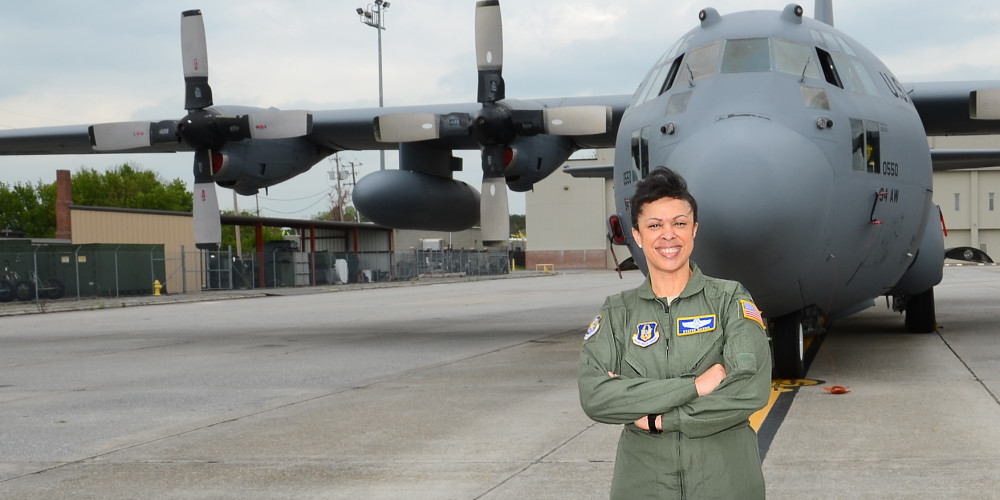One look at the resume of Maj. Gen. Stayce Harris (‘87, WW) and it’s easy to assume that a career as a military pilot was predestined. The daughter of an Air Force technical sergeant, she grew up moving across the United States every few years and even spent a handful of tours living overseas. In high school she began to plot her own career in the Air Force and was awarded an Air Force ROTC scholarship attending the University of Southern California.
But in her freshman year, an ROTC instructor encouraged her to compete for a scholarship for undergraduate pilot training. The opportunity was a revelation for her. Until then, she had assumed a career as an engineer would be her role in the Air Force, but here was an avenue to travel the world, one of her life’s passions, and as the pilot.
“It was an ‘aha’ moment because this was the first time the Air Force was allowing women in college to apply for pilot training,” says Harris. “They had already chosen women on active duty to receive the training but we were the first wave of women graduating from college [to participate]. I competed for that scholarship and was accepted. And that started my life becoming a pilot.”
Female Aviators
Women and minorities are historically underrepresented among military pilots. When Harris began her flight training in the early 1980s, she was one of the first African-American female pilots her instructors met. This experience was not without its challenges.
Retired Brig. Gen. Steven Roser, who became a mentor to Harris after she served under his command in the 14th Military Airlift Squadron, says there’s an “institutional bias” that can creep into any organization. When a candidate doesn’t look like someone’s preconceived idea of a leader, it can be challenging for that person to find acceptance, he explains. Without a precedent of female African-American aviators, Harris was forced to create her own beachhead within the Air Force.
“A lot of the life lessons that I have had, I learned them early,” she says. “And I am grateful. You have to trust in yourself and be persistent in your goals no matter what others may think.”
Since her undergraduate degree was in engineering, Harris wanted to broaden her aviation aperture and learn more than just piloting. She enrolled in a master’s of aviation management program at the Embry-Riddle Campus at Norton Air Force Base, Calif. Her experience at Embry-Riddle led to Harris developing an important part of her persona, and what has become a defining facet of her career: teaching and mentoring others.
“One of the greatest benefits was that I was able to become an adjunct professor at Embry-Riddle. I could give back some of the knowledge and experiences to those earning their bachelor’s degrees,” she says. “Embry-Riddle’s giving me that opportunity was unique. I really enjoyed that experience.”
Her Place in History
Harris left active duty in 1990 to pursue concurrent careers in the Air Force Reserve and as an international pilot for United Airlines. With her love of service and unquenchable thirst for travel, she describes her dual roles as “the best of both worlds.” She also became active in organizations that promote the contributions of female and African-American aviators.
“I consider myself a part of the legacy of trailblazers: the legacy of the Tuskegee Airmen and of the Women Airforce Service Pilots,” she says. “They blazed the trail and I am proud to walk that path and encourage others to do the same and follow their passion.”
Harris feels a duty to tell the stories of her predecessors. She believes it is these stories that will ultimately open the eyes of youth to new worlds of opportunity. She can already see the difference in the next generation of potential pilots.
“It is wonderful that young people nowadays don’t see any limits to what they want to do. And they see more people who look like them in the careers that they aspire to,” she says.
Harris is characteristically quick to praise the accomplishments of others but she will have her own entry in the history books. In 2009, she became the first African-American female aviator to attain the rank of brigadier general in the Air Force. Last year, she was named the first female in the Air Force Reserve to lead a numbered air force when she was named the commander of 22nd Air Force, Air Force Reserve Command. She is officially a reservist on full-time orders and has taken a leave of absence with United Airlines.
“She made it on talent. And she made it despite all kinds of biases,” says Roser, who flew to Las Vegas at his own expense to see Harris get pinned with her first star, designating her rank of brigadier general. “And how did she do it? By performing. It’s that simple.”
